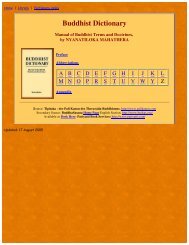Night and Morning with Bhikkhu Tissa
Night and Morning with Bhikkhu Tissa
Night and Morning with Bhikkhu Tissa
- No tags were found...
Create successful ePaper yourself
Turn your PDF publications into a flip-book with our unique Google optimized e-Paper software.
And I’m afraid I need a lot more concentration; I have trouble keeping my mind on any one thing for verylong. It just keeps jumping <strong>and</strong> running when I want it to be still!<strong>Bhikkhu</strong> <strong>Tissa</strong>: The nature of the untrained mind is to scamper around. Don’t feel discouraged. That’snothing unusual or surprising. Most of your life, perhaps, you have not really tried to discipline your mind, sonaturally when you first begin to try, you discover how unruly it really is. But the mind can be trained; we canbuild up concentration gradually.Gene: So here is something else to look into.<strong>Bhikkhu</strong> <strong>Tissa</strong>: Looking into reality—investigating things—is just what a follower of the Buddha shoulddo. These eight factors of the path complement each other, you see. So you should investigate them <strong>and</strong>practice them.Gene: The more you explain it, the more I realize how comprehensive this Noble Eightfold Path is. And Iknow you’re just sketching a bare outline for me. There’s so much to practice, so much to investigate here.<strong>Bhikkhu</strong> <strong>Tissa</strong>: Now then, knowing what you know so far, do you think this path is impossibly difficult?Is it entirely beyond you?Gene: It’s challenging, that’s for sure. But I couldn’t say it’s impossible. If I did I would be defeatist—Iwould just be evading <strong>and</strong> shirking <strong>with</strong>out knowing what I’m capable of. I’ll just have to try to follow thepath <strong>and</strong> see how far I can go.<strong>Bhikkhu</strong> <strong>Tissa</strong>: That’s right. It depends on you. The Noble Eightfold Path is the unsurpassed way to theending of suffering which the Buddha has taught to us.Gene: Well, I see it, venerable sir, at least in theory. It’s like I’m st<strong>and</strong>ing on a road <strong>and</strong> trying to lookahead to where it leads, but there are hills <strong>and</strong> turns <strong>and</strong> I can only see this one place where I’m st<strong>and</strong>ing.<strong>Bhikkhu</strong> <strong>Tissa</strong>: Which is exactly what you should see. The present moment is where we st<strong>and</strong> <strong>and</strong> wherewe have to do our work. All that we have is the present flashing before our senses. Never mind about what isover the next hill on the road—what about here <strong>and</strong> now? The Buddha said we must reach the end of theworld in order to overcome suffering, but he also said, as I told you, that right here in this body <strong>with</strong> itsperceptions <strong>and</strong> thoughts there is the world, the origin of the world, the end of the world, <strong>and</strong> the way to theend of the world. One cannot get there just by walking; but one who purifies himself <strong>and</strong> who comes tounderst<strong>and</strong> the world wisely can reach the goal. Consider your own mind <strong>and</strong> body, <strong>and</strong> your senses of eye,ear, nose, tongue, body, <strong>and</strong> mind, <strong>and</strong> the corresponding objects of each—aren’t these all right here, all<strong>with</strong>in reach?Gene: Yes, they’re all right here. I just hope all of these things will continue to get clearer—just like thosetrees out there emerging from the mist.(They both sit quietly for a moment, looking out the windows. The scene of damp green grass <strong>and</strong> trees has grownmuch brighter, suffused <strong>with</strong> light. A very slight breeze has begun to stir a few leaves, <strong>and</strong> the illusion of stillness beginsto give way. The day perceptibly advances.)<strong>Bhikkhu</strong> <strong>Tissa</strong>: The fog, the mist out there, comes <strong>and</strong> goes according to the conditions of nature. The fogin our minds is likewise subject to conditions. But we are the ones who have been unwittingly setting up thewrong conditions, through our craving. Do you wonder why so much of the path is concerned <strong>with</strong> avoiding<strong>and</strong> abstaining? It is because we are the authors of our suffering through wrong ideas <strong>and</strong> wrong behavior. Itis the stopping of harm that gives peace. It is the putting down of the burden that is enlightenment. Do yousee? When the sun comes <strong>and</strong> the wind comes the mist is driven away. Then the world appears to our eyes.The Dhamma is like sun <strong>and</strong> wind.Gene: Then I need plenty of it to get rid of my defilements. Let me ask you, Venerable <strong>Tissa</strong>, what can I doto keep greed <strong>and</strong> hatred <strong>and</strong> delusion from getting a grip on my mind <strong>and</strong> deceiving it?<strong>Bhikkhu</strong> <strong>Tissa</strong>: Sharpen your mindfulness. And, particularly, try to look at the world <strong>with</strong> wise attention.This means not to succumb to the superficial appearances of things, but to contemplate them dispassionately,remembering their true nature. Our senses are indiscriminate—they feed us great volumes of perceptionswhich can overwhelm us if we’re unwary. We need to restrain our senses, to govern them <strong>and</strong> control them sothat we don’t get swept away helplessly by the emotions they arouse.22
















